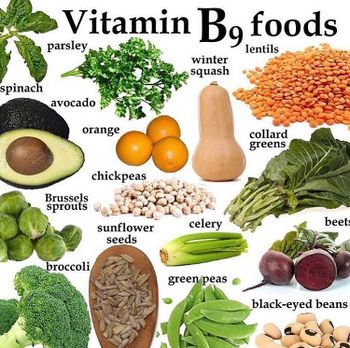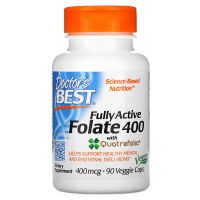Folate
From Wikiwel
See also : Vitamin B
Other name : Vitamin B9
Folate is one of the B-vitamins and is needed to make red and white blood cells in the bone marrow, convert carbohydrates into energy, and produce DNA and RNA. Adequate folate intake is extremely important during periods of rapid growth such as pregnancy, infancy, and adolescence.
- Do not confuse with Folic Acid ! Folic acid and folate are terms used interchangeably as though they are the same. They are not. Folate is a naturally occurring vitamin known as B9. Folate contains all the related isomers needed for B9 to fully benefit health. Folic acid is a synthetically derived molecule created in a lab in the early 1940s. Guess which is beneficial and which is risky.
- Folate is present in many foods, especially dark green vegetables. Spinach, kale, broccoli, and other veggies are well bestowed with natural B9. It's also available in whole grains and legumes that you purchase dry. You can even get folate from citrus fruits, melons, and bananas. Eggs are also a good source of folate. Apart from beef liver, meat is generally low in folate. Many foods are also fortified with synthetic folate, or folic acid.
- Another excellent folate source that can be used as a supplement is unfortified brewer's yeast. Brewer's yeast flake labels can be confusing, however. Some will list folic acid instead of folate as a key nutrient. They mirror the medical nomenclature confusion just like almost everyone else! The People's Chemist recommends a particular brewer's yeast so you can avoid confusion.
- The amount of folate usually required is measured in mere micrograms (mcg). That is all that's needed on a daily basis to help metabolize proteins and set our DNA right for protecting us from disease.
- As a water soluble B vitamin, whatever isn't needed is passed through the urine. But the flip side of water soluble vitamins is that they are not stored well in the body. Folate is relatively unstable, especially with heat. Some raw veggies, such as romaine lettuce, should be part of our daily diet.
Special Precautions of Folate
- High levels of intravenous folic acid intake may cause seizures, and high doses of supplemental folic acid have been associated with an increased risk of the progression of certain cancers.
- Dietary levels of folate have not, however, been associated with any adverse effects.
- An intake of folate above 1000 mcg for adults or 800 mcg for those aged 18 years or under can hide a deficiency of vitamin B12. Vitamin B12 deficiency can cause permanent nerve damage and paralysis.
- Folate is only beneficial as part of a wide-ranging, varied, and nutritious diet.
The benefits of Folate are
- Folate benefits include red blood cell production as well as protection against many forms of cancer, pulmonary diseases, osteoporosis, macular degeneration, depression, and Alzheimer's disease.
- Folate promotes vascular health by lowering homocysteine, an amino acid that, at high levels, raises the risk of dementia and cardiovascular disease, including heart disease and stroke.
- Folate has also been shown to reduce the risk of developing colorectal, ovarian, and breast cancers and to help stop uncontrolled cell growth, one of the primary characteristics of all cancers.
- Folate makes you smart and happy, Lack of folate makes you depressed and stupid

